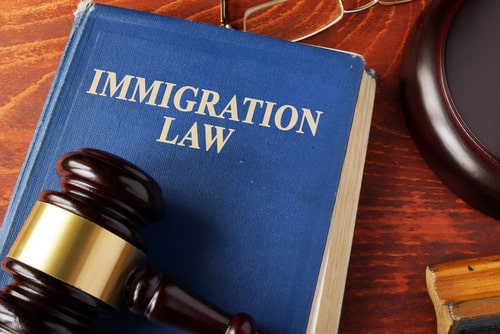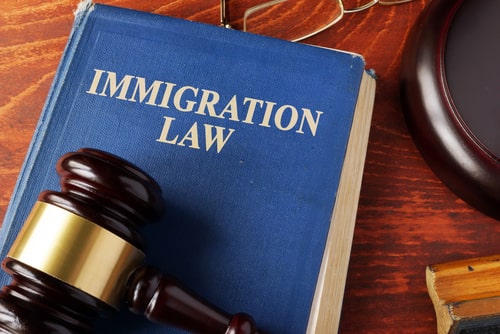Recent Blog Posts
What to Do When You Face Deportation
 Being threatened with deportation - or “removal,” as it is now commonly called - can be terrifying. There is likely a good reason you left your home country for the relative safety and stability of the United States. If you are removed, your likelihood of being legally allowed back into the U.S. is slim. Removal proceedings can be started for various reasons, including an expired visa or a criminal conviction. The most important thing you can do to protect yourself if you are threatened with deportation is to find an aggressive DuPage County, IL removal defense lawyer to represent you.
Being threatened with deportation - or “removal,” as it is now commonly called - can be terrifying. There is likely a good reason you left your home country for the relative safety and stability of the United States. If you are removed, your likelihood of being legally allowed back into the U.S. is slim. Removal proceedings can be started for various reasons, including an expired visa or a criminal conviction. The most important thing you can do to protect yourself if you are threatened with deportation is to find an aggressive DuPage County, IL removal defense lawyer to represent you.
Removal Based on Criminal Convictions
American citizens might face jail time if they are convicted of a crime, but immigrants who have not yet become naturalized citizens could be removed from the country. Not all criminal convictions will result in deportation proceedings. It is not always clear which crimes make someone deportable. There is no precise list of crimes that equal instant removal.
Citizenship for Immigrant Parents and Their Children
 Generally, an immigrant parent who becomes a naturalized U.S. citizen can also obtain citizenship for his or her minor children as long as they meet certain requirements. Parents with minor children often move to the United States hoping to provide a better life for their children. Some parents will move to the U.S. ahead of their children to begin a life and bring their children into the country at a later date. Many parents begin the immigration process primarily because they want to provide better opportunities for their children. If you want your child to become a U.S. citizen through you, it is important to speak to a DuPage County, IL immigration attorney to make sure that your child will meet the legal requirements to become a citizen.
Generally, an immigrant parent who becomes a naturalized U.S. citizen can also obtain citizenship for his or her minor children as long as they meet certain requirements. Parents with minor children often move to the United States hoping to provide a better life for their children. Some parents will move to the U.S. ahead of their children to begin a life and bring their children into the country at a later date. Many parents begin the immigration process primarily because they want to provide better opportunities for their children. If you want your child to become a U.S. citizen through you, it is important to speak to a DuPage County, IL immigration attorney to make sure that your child will meet the legal requirements to become a citizen.
When Can Children of Naturalized Citizens Get Citizenship?
If you are going through the process to become a naturalized U.S. citizen, your minor children can likely gain citizenship through you. Your children must meet certain requirements to become citizens as well. These requirements include:
Can I Claim Asylum in Illinois?
 If you cannot return to your home country because you would be persecuted based on a protected characteristic, you may qualify for asylum in the United States. If you are granted asylum, you will become a legal resident and will likely be able to become a U.S. citizen. Asylum is often misunderstood. Many people are afraid to return to their home country due to general violence, such as gang or cartel activity or excessive crime. These individuals may not qualify for asylum. To be granted asylum, you must prove that multiple factors exist, such as your protected characteristic and the nature of the persecution you would face if you returned to your country of origin. An Itasca, IL immigration attorney can help you determine whether you may be able to claim asylum.
If you cannot return to your home country because you would be persecuted based on a protected characteristic, you may qualify for asylum in the United States. If you are granted asylum, you will become a legal resident and will likely be able to become a U.S. citizen. Asylum is often misunderstood. Many people are afraid to return to their home country due to general violence, such as gang or cartel activity or excessive crime. These individuals may not qualify for asylum. To be granted asylum, you must prove that multiple factors exist, such as your protected characteristic and the nature of the persecution you would face if you returned to your country of origin. An Itasca, IL immigration attorney can help you determine whether you may be able to claim asylum.
What You Must Prove to Be Granted Asylum in the United States
In order to gain asylum, you must prove all of the following:
Planning for an Immigration Interview
 Going into a government office for an immigration interview can be very intimidating. However, it is a normal part of the immigration process that everyone wishing to become a naturalized citizen must go through. Knowing what to expect - and what to do - before you arrive can help you feel ready and make a good impression. While it is hard to predict exactly which questions you will or will not be asked, your Itasca, IL, immigration attorney can help you prepare for most possibilities. They may be able to sit down with you for a practice interview to make sure you know how to answer some of the questions you will probably need to answer during the real thing. As long as you are honest and polite during your interview, you will most likely do well
Going into a government office for an immigration interview can be very intimidating. However, it is a normal part of the immigration process that everyone wishing to become a naturalized citizen must go through. Knowing what to expect - and what to do - before you arrive can help you feel ready and make a good impression. While it is hard to predict exactly which questions you will or will not be asked, your Itasca, IL, immigration attorney can help you prepare for most possibilities. They may be able to sit down with you for a practice interview to make sure you know how to answer some of the questions you will probably need to answer during the real thing. As long as you are honest and polite during your interview, you will most likely do well
When Do You Need an E Visa?
 The E visa is one of the most versatile and valuable visa categories if you are looking to enter the United States for business, investment, or trade purposes. There are various visas, and it is vital to make sure you are applying for the proper one. An Illinois immigration lawyer can help oversee your case and help determine the most suitable visa for you.
The E visa is one of the most versatile and valuable visa categories if you are looking to enter the United States for business, investment, or trade purposes. There are various visas, and it is vital to make sure you are applying for the proper one. An Illinois immigration lawyer can help oversee your case and help determine the most suitable visa for you.
Coming to the United States as a Treaty Trader or Investor
One of the most common reasons to pursue visas is under the E-1 and E-2 subcategories for treaty traders and investors. The E-1 visa is meant for those engaged in substantial trade activities between their home country and the United States, such as exporting and importing goods or providing cross-border trade services.
Removing Green Card Conditions: What to Know
 Getting green cards through marriage to American citizens still comes with attached strings. Typically, “conditional” residency applies for initial two-year periods while immigration officials watch marriages closely for legitimacy. Post-two years, foreign spouses must confirm genuine marriages by petitioning removal of conditions. Failing this mandatory next step can jeopardize your conditional residency entirely. An Illinois immigration lawyer can help you ensure you are on the right track through the process of removing the conditions.
Getting green cards through marriage to American citizens still comes with attached strings. Typically, “conditional” residency applies for initial two-year periods while immigration officials watch marriages closely for legitimacy. Post-two years, foreign spouses must confirm genuine marriages by petitioning removal of conditions. Failing this mandatory next step can jeopardize your conditional residency entirely. An Illinois immigration lawyer can help you ensure you are on the right track through the process of removing the conditions.
Understand Requirements
Remember, conditionally permanent resident status and its accompanying green card only convert into non-conditional residency once immigration officials satisfy themselves regarding underlying marriage validity. Pay close attention to the 90-day widow beginning 90 days before conditional green cards expire for submitting applications. All requirements must be strictly followed, or unsalvageable immigration consequences will arise.
When Do You Need an E Visa in Illinois?

Immigrating to the United States can be a complicated process full of visa categories and legal requirements. One type of nonimmigrant visa issued by the U.S. government is the E visa, which allows qualified treaty traders and investors to temporarily work and live in the U.S. An Illinois attorney can help you with the visa process.
What is an E Visa?
The E visa has two categories - E-1 for treaty traders and E-2 for treaty investors. The E-1 visa is meant for those engaged in substantial trade between the U.S. and the treaty country, such as international transportation of goods. The E-2 visa is geared towards those who have invested or are actively investing substantial capital in a U.S. business.
To qualify for either visa, you must be a national of a country with a treaty of trade and navigation with the U.S. There are over 90 eligible treaty countries, such as Canada, France, Germany, Italy, Japan, Spain, and the U.K. The company where you work must also have the treaty country's nationality.
Steps to Take if You Are Facing Deportation in Illinois
 Being served a Notice to Appear for removal proceedings can be terrifying. However, working quickly alongside an attorney can help you pause or stop deportation. Fighting your case and figuring out all possible defenses takes strategic action. An Illinois lawyer can help you build a solid case to prove why you should stay in the country.
Being served a Notice to Appear for removal proceedings can be terrifying. However, working quickly alongside an attorney can help you pause or stop deportation. Fighting your case and figuring out all possible defenses takes strategic action. An Illinois lawyer can help you build a solid case to prove why you should stay in the country.
You Need Legal Representation Right Away
Contacting a lawyer right after receiving the notice will give your attorney the lead time to build the most robust case possible. Illinois has a Right to Counsel Act. They will evaluate your situation, identify any grounds to contest removal and handle communications with immigration officials on your behalf.
Gather Relevant Documentation
Work closely with your lawyer to gather documents relevant to your immigration, criminal, and personal history. This includes visas, green cards, birth certificates, marriage licenses, tax records, pay stubs, mortgages, leases, and more. Any evidence that supports your ties to the U.S. will bolster your case. Thorough documentation also helps identify potential defenses.
How to Bring Your Foreign Spouse to Live in Illinois
 If you are a U.S. citizen or green card holder living in Illinois who wants to bring your foreign fiancé or spouse to join you, there are specific immigration pathways for doing so. This blog will explain the process for obtaining a fiancé or spousal visa with a DuPage County, IL immigration lawyer, as well as attaining permanent resident status for your spouse once in the United States.
If you are a U.S. citizen or green card holder living in Illinois who wants to bring your foreign fiancé or spouse to join you, there are specific immigration pathways for doing so. This blog will explain the process for obtaining a fiancé or spousal visa with a DuPage County, IL immigration lawyer, as well as attaining permanent resident status for your spouse once in the United States.
Obtaining a Fiancé Visa
A K-1 fiancé visa allows your foreign fiancé to enter the U.S. for the purpose of getting married to you within 90 days. Here are the steps:
-
You must file an I-129F fiancé visa petition with USCIS proving you have a genuine relationship and intend to marry within 90 days of your fiancé’s arrival.
-
Once approved, your fiancé can apply for a K-1 visa at the U.S. embassy in their home country. This involves an interview, medical exam, and other screening steps.
Debunking Common Myths About U.S. Immigration
 The process of immigrating to the United States usually involves many complex tasks that must be completed in a specific order. A single misstep in this process could lead to delays or even a denial of someone’s visa application. As a result, it is important to understand the details of the process and to seek guidance when an applicant has questions. Otherwise, their hard work could be undone by a misunderstanding of how to apply successfully for favorable immigration status. For example, many applicants struggle unnecessarily in their application processes due to the myths outlined below.
The process of immigrating to the United States usually involves many complex tasks that must be completed in a specific order. A single misstep in this process could lead to delays or even a denial of someone’s visa application. As a result, it is important to understand the details of the process and to seek guidance when an applicant has questions. Otherwise, their hard work could be undone by a misunderstanding of how to apply successfully for favorable immigration status. For example, many applicants struggle unnecessarily in their application processes due to the myths outlined below.
Myth: All/No Visas Are Subject to Quotas
Visa applicants are sometimes under the impression that there are either no restrictions on the number of visas approved annually or that there are quotas in place for every type of visa available. In reality, some visas are subject to quotas and others are not. An experienced attorney can help individual applicants to accurately assess whether the unique visa type that they are seeking is subject to limited availability or not.



Contact Unzueta Law Group, P.C.
The use of the Internet or this form for communication with the firm or any individual member of the firm does not establish an attorney-client relationship. Confidential or time-sensitive information should not be sent through this form.
I have read and understand the Disclaimer and Privacy Policy.



